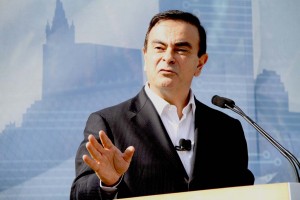
After a long wait, Renault-Nissan CEO Carlos appears to have found the third leg of the stool for his long-sought global alliance.
During a Wednesday news conference in Brussels, Belgium, German automaker Daimler AG is expected to announce the formation of a new partnership with the Euro-Japanese Renault-Nissan Alliance.
The makers reportedly will work on a variety of products, including a much-needed new entry for Daimler’s Smart car brand, as well as the development of vehicle components. Industry insiders have been told the new partners anticipate savings could reach into the billions of dollars annually.
The proposed deal is not expected to have the grand reach of the now-abandoned marriage between Daimler and its former American partner, Chrysler; nor will it be as extensive as the Renault-Nissan Alliance, in which the two companies have extensive cross-holdings and now cooperate on most of their vehicle programs.
(Renault holds a controlling 44% stake in its Japanese affiliate, while Nissan holds a 15% stake in its European partner.)
There likely will be some more modest stock swaps to add weight to the Daimler/Renault-Nissan venture, and they are expected to sync some of their product development programs, said a well-placed source. But for the large part, the insider added, “They will continue to operate as independent companies.”

Daimler CEO Dieter Zetsche is hoping to do better with this alliance than his company's previous marriage to Chrysler.
The new alliance could help fill significant gaps in each of the makers’ line-ups. Daimler’s Mercedes-Benz brand focuses on high-line luxury products, while its Smart division produces a pint-sized 2-seater dubbed the fortwo.
A Daimler executive, asking not to be identified by name, tells TheDetroitBureau.com that ongoing discussions with Renault will lead to the addition of at least one new and much-needed model to the Smart line-up, a four-seater that is expected to expand the brand’s appeal, especially in the U.S market.
While Nissan has tried to cover a relatively wide swath of the market with its Nissan and Infiniti brands, Renault is primarily focused on low to mid-range models and could benefit from Mercedes’ luxury segment expertise.
As the world’s biggest truck manufacturer, Daimler, meanwhile, is also likely to gain from the proposed deal because of Renault’s ties to the Swedish truck manufacturer, AB Volvo. Some reports suggest that Renault may sell its 20% stake in Volvo to Daimler.
Carlos Ghosn, who serves as CEO of both Nissan and Renault, has long considered ways to extend that alliance. He has formed partnerships in Russia, among other places, bought Romania’s Dacia and acquired South Korea’s newest and smallest automaker, Samsung.
But Ghosn’s goal of teaming up with another major maker has until now failed to reach fruition. At one point, the Brazilian-born executive seemed to ally with one of the American makers as the “third leg of the stool.” But General Motors rejected one proposed deal and Ford apparently nixed another. Renault-Nissan was initially seen by some as a possible white knight ready to save Chrysler when it went into bankruptcy, last year, but in the end, the smallest of the American makers was rescued by Italy’s Fiat.
Daimler, meanwhile, divorced Chrysler in 2007, ending a nearly decade-long marriage that seemed doomed almost from the start. Since then, the maker has pulled out of less expansive alliances with both Mitsubishi, of Japan, and Korea’s Hyundai.
The challenge, observers say, will be for the new partners to clearly outline both what they want from their alliance – and what they don’t want to include in the deal.
